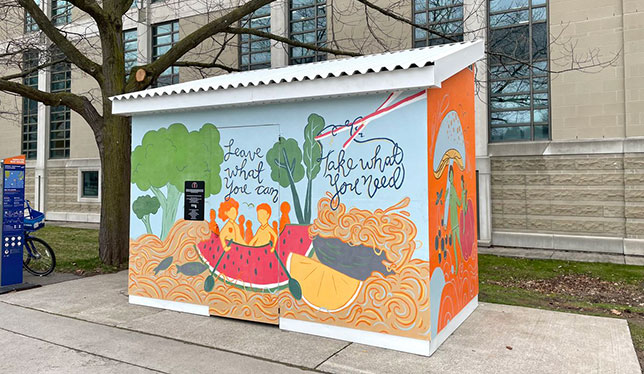How a community fridge is feeding students in more ways than one
Sustainability projects like this at McMaster help to meet campus needs and provide valuable opportunities for students to put theory – and their passions – into practice.

It’s easy to expect that students who make it to university are on a straightforward path to success. However, finding steady, affordable access to healthy food is a challenge for many students, which can, among other things, impact their academic performance.
In 2016, the national charity Meal Exchange, which works with young people to develop just and sustainable food systems, reported that nearly two in five university students on Canadian campuses experienced moderate or severe food insecurity. More recently, results from a 2021 Meal Exchange survey indicated that 59 per cent of student respondents at our institution, McMaster University, faced some level of food insecurity.
Several McMaster groups have worked hard to help students access a reliable supply of healthy food. However, some studies and in-person interviews at McMaster determined that the problem was more complex and the need much greater than those groups had expected.
A group of second-year students studying sustainability in all its forms knew some of their classmates were struggling to find healthy, affordable meals. They researched and advocated for possible solutions.
“We got to pitch our [project] ideas to a panel of university decision-makers. Our group pitched the idea of bringing a community fridge to campus,” said Mohammad Kamal, a student who worked on the project. A community fridge is an outdoor fridge, freezer, and pantry structure which is always open for anyone to donate what they can or to take what they need.
As part of our role at the academic sustainability programs office, we facilitated discussions across campus to explore turning this idea into action.
With support from more than a dozen campus stakeholders, a group of 15 undergraduate students worked together to rally support for, design, and implement the McMaster Community Fridge, which has been open since April 2022.
While the project is considered a great success, the needs and resources of communities are complex and ever-changing. The fridge receives plenty of donations, but demand is so high that its shelves are often empty. Current efforts are focused on finding community food vendors and campus departments who can consistently donate food to the fridge and eliminate gaps.
These experiences have helped to inform a national guidebook for setting up campus community fridges, which has been compiled by the University of Victoria, University of Alberta, University of Guelph, McMaster University, Community Food Centres Canada, and a student working to create the Community Food Hub in Scarborough, Ontario.
In addition to the challenge of food insecurity, students from McMaster have also helped with other sustainability initiatives. Sustainability is a complex problem that requires interdisciplinary solutions, and our program offers students with opportunities to tackle these kinds of challenges, create a sustainable world, and be part of something bigger than themselves.
They include reducing electronic waste by working with university and community partners to refurbish and donate computers to communities in need; supporting native bees; and tackling plastic pollution by reducing barriers to water-bottle refilling.
Sustainability projects such as these provide students with opportunities to employ their passion and research skills to bring about positive change, both inside and outside the university campus. Through a unique combination of theory and practice, they are developing as sustainability advocates We need people who can understand complex challenges and work across disciplines, industries, and sectors to collaborate to create holistic and interdisciplinary solutions. We aspire for them to continue to grow as lifelong learners and leaders of today and tomorrow.
Abbie Little is the community engagement coordinator of McMaster’s academic sustainability programs office. Kate Whalen is McMaster’s associate director of and course instructor in McMaster’s academic sustainability programs office.
Featured Jobs
- Education - (2) Assistant or Associate Professors, Teaching Scholars (Educational Leadership)Western University
- Veterinary Medicine - Faculty Position (Large Animal Internal Medicine) University of Saskatchewan
- Psychology - Assistant Professor (Speech-Language Pathology)University of Victoria
- Business – Lecturer or Assistant Professor, 2-year term (Strategic Management) McMaster University
- Canada Excellence Research Chair in Computational Social Science, AI, and Democracy (Associate or Full Professor)McGill University















Post a comment
University Affairs moderates all comments according to the following guidelines. If approved, comments generally appear within one business day. We may republish particularly insightful remarks in our print edition or elsewhere.